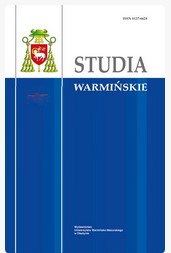Faryzeusze i saduceusze a eschatologiczne groźby Jana Chrzciciela w Mateuszowej narracji 3,7-12
The Pharisees and Sadducees versus Eschatological Threats of John the Baptist in Matthew’s Narrative 3: 7-12
Author(s): Zdzisław ŻywicaSubject(s): Christian Theology and Religion, Biblical studies
Published by: Wydawnictwo Uniwersytetu Warmińsko-Mazurskiego w Olsztynie
Keywords: pharisees; sadducees; Synagogue; Temple; John; Jesus; tradition of the elders; metanoia; judgment; rejection;
Summary/Abstract: The author of the article, analyzing Matthew’s pericope on the activity of John the Baptist (3,7-12), and in it especially his speech taken from the source Q, concludes that in the section of the activity of John (3,1-17), the Evangelist, the pericope 3,7-12, is preparing the narrative of Jesus’ baptism (3,13-17). Thus, in the context of the entire Gospel narration, the Evangelist indicates at the stage of announcing his coming the greatest enemies and his eschatological work of salvation. They are the entire religious elite of the Synagogue and Temple with their “tradition of the elders”, above all the Pharisees and Sadducees as its most zealous supporters and executors from their people. In the “tradition of the elders”, Matthew recognises the source of hostility and the fundamental reason for rejecting Jesus the Messiah and the Son of God. Therefore, in his narration, both John and Jesus call the religious elite to radical metanoia, i.e. rejecting it and entering the path of uprightness, i.e. the path of fulfilling God’s will now communicated by Jesus, and later by the Church built by him (4,17.18-22; 9,9; 23,1-12; 28,16-20). The supreme reason that should lead them to enter the path of metanoia immediately is God’s judgment on the people of Israel and, above all, on them as their shepherds. It is happening right now in the saving work of His Son and Messiah. Only accepting the gift of salvation and living the Good News in the Church built by Him for all nations can save them from being rejected and deprived of the privilege of the chosen people and the dignity of Abraham’s true children. What is more, it can prolong the possibility of continuing the Patriarch’s mission – as “verus Israel”, a model of unconditional and sincere faith in God and entrustment to His will.
Journal: Studia Warmińskie
- Issue Year: 59/2022
- Issue No: 59
- Page Range: 225-240
- Page Count: 16
- Language: Polish

